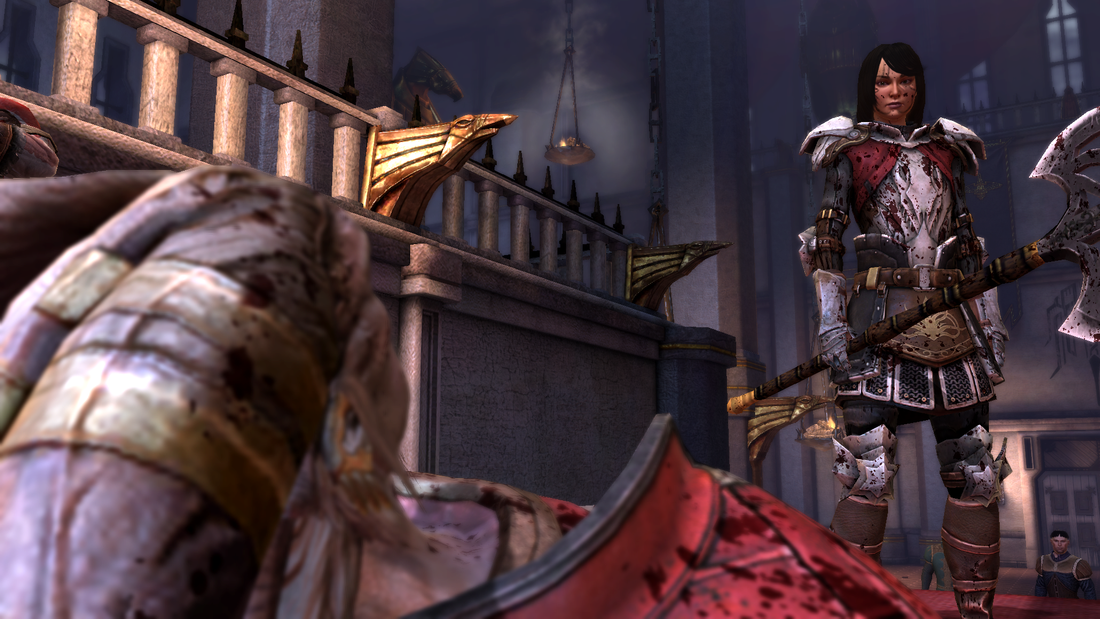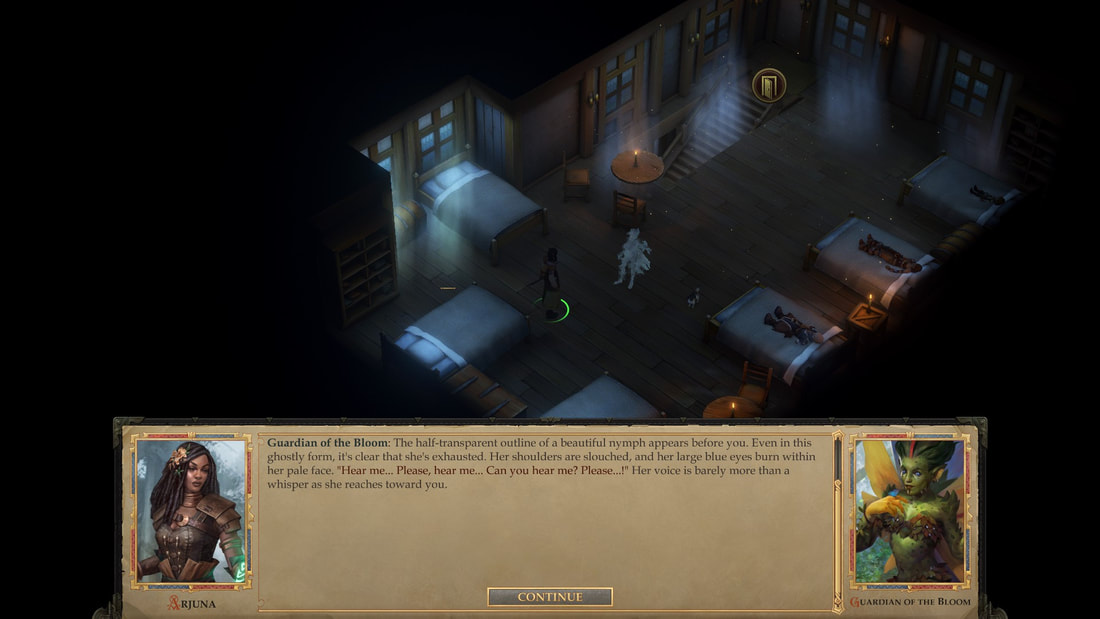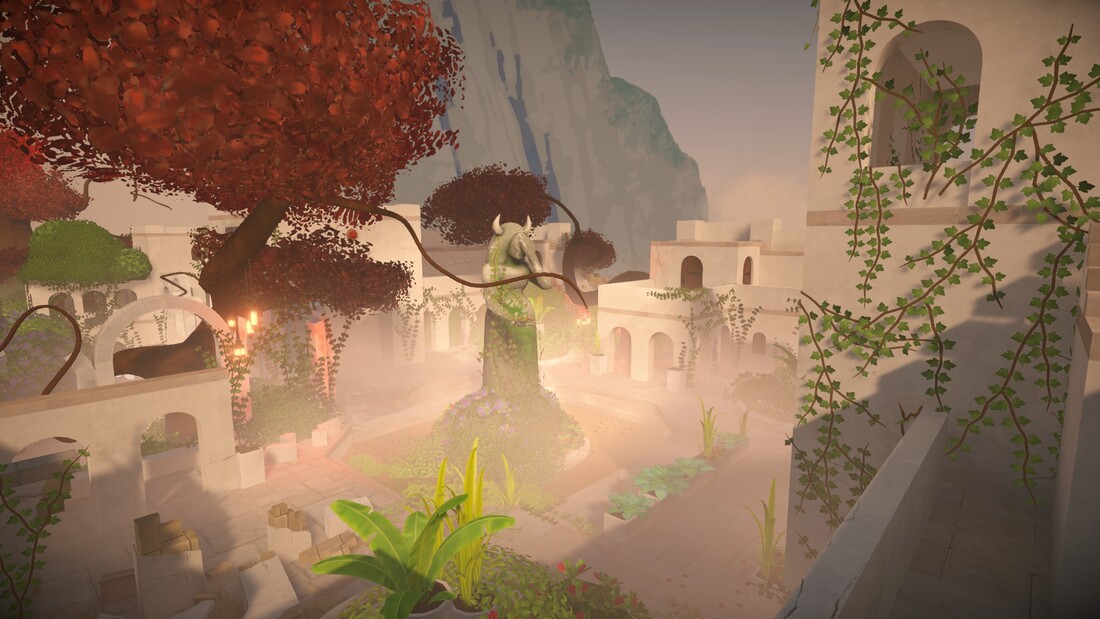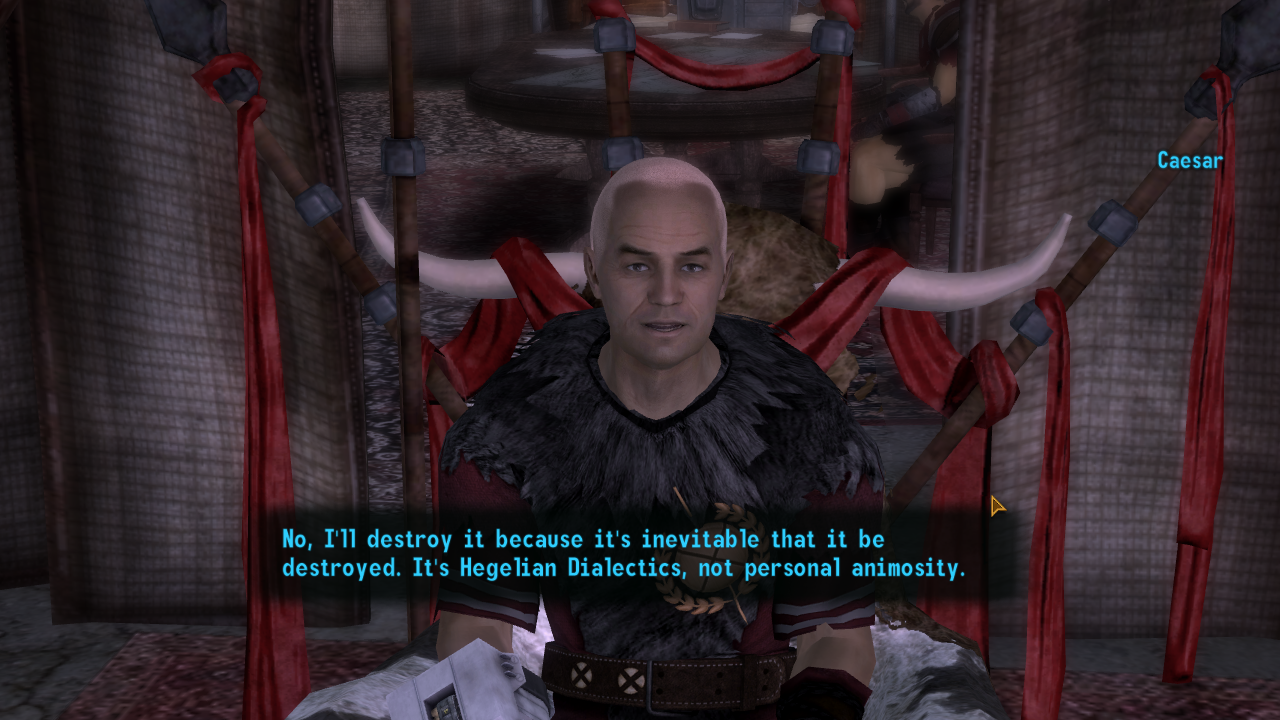|
by Luv Mehta We've got five articles in a row in this series! Work's been heavy and this month's been bad, but I'm glad I got this month's article out, even if it was slightly delayed. If you haven't checked the previous articles in this series, I highly recommend you check them out. A quick refresher, just in case - I’m recording the new (and old) stuff I’m watching, playing or listening to, and I’m doing it in a series of monthly articles. I’ll write some quick notes about the old stuff I went back to in the first section (Repeat Value), before getting into the new stuff (...The New Stuff). This month doesn't have as many games as usual, mainly because everything I played took a long amount of time. That being said, I think there's stuff here you might discover and enjoy anyway. Repeat ValueDragon Age III’ve never completed Dragon Age II all the way through more than once, so I decided now would be as good a time as any to do so. Dragon Age II is considered the black sheep of the series for many reasons - because of an incredibly shortened development period and pressure under their new publisher, EA, it felt like a step back in many ways from its predecessor, Dragon Age: Origins. Where Origins gave a bunch of species for character creation choice, a lot of unique locations and a whole country to cover, Dragon Age II gave you a single species for your protagonist and was set in and around a single city - and still reused the same maps constantly whenever you had to journey through a cave or a passageway (which was a LOT). But Dragon Age II also has, quite possibly, the best story quest design of any western RPG, and a lot of it is because the game bucks traditional tropes so often. Your lead isn’t some chosen one, they aren’t a hero chosen by fate or marked by extraordinary circumstances, they’re just part of a refugee family that has to survive and find a way to earn money. You don’t have a mission to save the world or anything - you’re an active observer in a city full of religious, social and political tensions that always threaten to cause immense local destruction. Most of your playthrough is spent around talking to the people in the town and helping them out, finding ways to establish your footing and make yourself well-known, and helping your friends with their personal problems. You do this over a span of six years, with intersecting tensions giving way to interdependent storylines being conveyed through multiple quests that all build up to some sort of climax across all three of the game’s acts, with all but the first beautifully culminating in a chaotic explosion of conflicts that test the bonds and ideals you’ve cultivated by then. I'm pretty glad I played it again. The New Stuff4. AbzuThis is a bit of a cheat entry, I had played this a while back and forgot to log it. Abzu is made by many of the same people that made Journey (an extremely highly acclaimed game that I haven't played), and is meant to be more of an experience than a challenge, using a great art style and good music to buoy your interest. It's very well-reviewed as well, and I got it for free off the Epic Game Store. I'll be honest, I didn't really like it. I didn't hate it either, but nothing in the game moved or affected me in any way, which, for a game like this, can be fatal. That being said, I seem to be in the minority here, so do check it out and see if this is something you might like. 3. Pathfinder: KingmakerThis is another game I really wanted to like - and unlike Abzu, Pathfinder: Kingmaker has basically everything I would like in a game. It's an RPG (which I'm a sucker for), it uses the Pathfinder tabletop RPG system (which I'm playing in two separate real-life campaigns), and it's isometric (which I find leads to the best RPG gameplay) and has a great character creator (which I'm a HUGE sucker for). And yet, I ended up abandoning it after 25 hours. There are a whole bunch of computer RPGs that have adapted some sort of tabletop RPG system - the first two Baldur's Gate games adapted the AD&D system, Vampire: The Masquerade - Bloodlines and the recent Shadowrun games are also examples of good system adaptations - but what you'll usually see is that these games have never really faithfully adapted the systems into their gameplay for a simple reason - they wouldn't be fun to play if they were. A lot of the fun in tabletop RPGs comes from improvisation, both on the part of the Game Master (the one creating the world, telling the story and organizing the encounters) and the players (who roleplay characters in this world and affect the story by interacting with it), and there is no room for improvisation in a computer RPG, since the computer itself is the GM and strictly follows the design of its code. Pathfinder: Kingmaker faithfully adapts the ruleset of its tabletop counterpart, and all those associated demerits hit even harder because of this. For example, say you journey through a cave and get stuck in a web trap. In the system, webs can affect a large area and trap you for 10 minutes per level, and you can attempt to break out and slowly make your way out of the heavy web strands. This can be scary and challenging when there are enemies approaching, but when there's no danger, it ends up being a chore (you have to keep rolling to break free of your immobilization, and once you do, you need to keep rolling while slowly making your way out to make sure you don't get trapped and immobilized again). A good DM would fast forward through the trap to make sure the players didn't get bored or irritated and got to the good part quicker, but Pathfinder: Kingmaker doesn't give you that benefit - you have to wait until the randomized dice rolls the computer generates come in your favour, and hope that they keep favouring you and don't suddenly trap you again. Now, imagine you're going through a cave system with five web traps and have to go through the same arduous process and waste time if you didn't spot and disarm them first - or if they were never meant to be spotted before they were sprung. Modern isometric RPG games like Shadowrun and Pillars of Eternity come with a lot of quality-of-life improvements, making sure you're challenged and still having fun. It's kind of strange seeing a modern game giving very few concessions in this regard, when even Baldur's Gate 2 made plenty of adjustments to keep the pace snappy and fun. The core gameplay is good through, and if the dungeons were designed better then I would definitely have enjoyed it more. As it stands, I've spent too much time with this game and gotten very little in return, so I've had to abandon it, which is a pity. 2. Heaven's VaultI really liked this one. Heaven's Vault is an adventure game revolving around archaeology, where you explore multiple places, make discoveries about the past, and translate runes written in a script specifically for this game, with around 40 characters indicating different things from tone to age to tense. I wanted to play a game that took the mystery-solving elements of Obra Dinn and the feeling of exploration and discovery from Outer Wilds, and I had heard that Heaven’s Vault filled that niche quite well. I decided to buy it and try it out, and while it wasn’t exactly that, I found an interesting game with a lot of minor issues, a lot of great writing, and a lot of intelligence and heart. The setting of Heaven's Vault is interesting and fairly unique. It's set in outer space, but instead of exploring planets in a solar system, you explore a whole bunch of moons on a strange celestial river. The process of inter-satellite travel isn't a huge amount of fun by itself, but it sets the tone nicely, and having the freedom to explore in any order you'd like is quite welcome. Most of the game involves either going to civilized moons to interact with a whole bunch of characters (who are mostly written very well, with complex feelings and agendas and relationships with you), or going to unexplored planets to scrutinize ancient architecture and technology to find more clues that can lead you to other unexplored planets. All-in-all, it's a 20 hour game, and while it does feel a bit overlong towards the end, the experience is well worth it. One word of caution - there is a moment towards the end where you reach a point-of-no-return that hurries you along to the finale, and it’s dependent on you doing something that has far reaching consequences that aren’t immediately clear. So when I reached the last part of the story, it felt like I was being hurried towards the ending and had skipped over important parts. That being said, this does seem like a game that has good replay value, and it's well worth the money. 1. Fallout: New VegasI've said this before, but BioWare and Obsidian are two of my favourite game studios. Both are western RPG developers that have made games that have deeply affected me, and it's fascinating to see the different trajectories these game studios ultimately took. BioWare is more prestigious, successful and influential, but being owned by a giant publisher has clearly affected their recent work to a point that their most recent game, Anthem, was a trend-chasing loot-based shooter with none of the famous world building or characters that BioWare is traditionally known for, and it's the only PC game of theirs that I haven't played, and have no intention of playing. Obsidian, on the other hand, is slightly newer (made by the employees of Black Isle, an old RPG studio and BioWare contemporary that made the original Fallout games and Planescape: Torment, among others, and ultimately closed down), and started out by making sequels to BioWare and Bethesda RPGs before eventually making their own original properties, and they've always been known for two things - being in perpetual financial trouble since their inception, and making incredibly well-written, experimental and ambitious RPGs that they've rarely had the resources to perfect and polish. I had played basically every Obsidian game except for Fallout: New Vegas (their most famous, successful and well-known game), so this month I decided to finally take the plunge and play it properly. A small Fallout primer - the first two games were late 90s isometric RPGs with turn-based combat, and when Bethesda bought the franchise IP and made a new entry around ten years later (with the massively successful Fallout 3), it made a third-person RPG that took the open-world mechanics and feel of their other flagship series, Elder Scrolls, and added a pseudo turn-based slow motion mechanic and gunplay to reference its predecessors. While it was massively critically acclaimed at the time, retrospective reviews are slightly cooler towards it, citing the lacklustre story and writing, as well as the poor shooting mechanics, as proof that they needed some time to iterate and improve on their formula. With Obsidian having a lot of ex-Black Isle members, when Bethesda contracted them to make a spinoff sequel set in a post-apocalyptic version of the Mojave desert, there was a fair amount of experience and prestige brought forward to the project. And while Fallout: New Vegas didn’t immediately get critical acclaim and a bunch of accolades, the passage of time has vindicated its position as one of the best modern western RPGs. It's a extremely long game - with all 4 DLC, the playtime goes up to 50 hours - and I finished it literally yesterday. And yeah, this is definitely one of their absolute bests. Obsidian has a knack for putting competing factions and ideologies in its games and providing opportunities for you to connect and work with them, and the studio’s writers use these groups to deepen the world of their games. For example, Pillars of Eternity 2 had a whole bunch of faction sidequests that gave you a bunch of culturally opposed groups consisting of casteists, capitalists and colonialists; Knights of the Old Republic 2, by contrast, gave you contrasting factions in most of the planets that gave new perspectives on the Light and Dark side of the Force. This game might be their most accomplished in that aspect - there are over a dozen factions and groups to work for, investigate and align yourself with, and it even allows you to carve your own path to independence - just like in another RPG of theirs, the heavily underrated Tyranny. The DLCs for New Vegas are also notable and fun, but they also made me think about how RPG DLCs are pretty strange by design - nearly all of them introduce a huge map and a bunch of places to explore and powerful weapons/armour to find, and they’re usually designed to be played anytime before the main story’s end, which means you have to stop whatever the game’s plot is guiding you towards, disrupting the carefully designed pace of the main campaign to immerse yourself in another expansive (if smaller) mini-campaign with its own quirks and characters to find. They’re usually designed for returning players, but people playing a “Premium Edition” for the first time (which is usually a bundle including the game and all its DLCs) can feel a severe tonal/gameplay whiplash because of this. The only game where I’ve seen such DLC work well is Mass Effect 2, and even that was because the original game was such a varied modular experience by design that the DLCs slotted themselves in perfectly. Either way, though, even with the poor combat mechanics it inherits from Fallout 3, it's a great experience with lots of replay value, and I'll definitely play it again someday. And that’s it for this month! Have a great month, and check back next month for more!
Follow us on Facebook and Instagram to be notified whenever we release new articles.
Do you use an RSS reader? Even better!
0 Comments
Your comment will be posted after it is approved.
Leave a Reply. |
Categories
All
Archives
December 2022
|




 RSS Feed
RSS Feed
